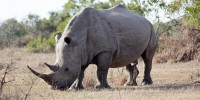Poaching Issue at Kruger
The Kruger National Park in South Africa is facing an issue with its fight against rhino poaching. The issue is one of trust. Trust within the rangers themselves is being questioned after one of the head rangers was arrested for aiding poachers.
Rodney Landela had worked up the ‘ranger ranks’ over his 15 year career, from field ranger to regional ranger. Many tipped him to be a contender for the parks head ranger position.
High profile arrest
In July 2016 Landela was caught fleeing the scene of a dead rhino. A bullet from a park issued rifle and rhino blood on his shoes linked Landela to the dead animal. He was arrested and faces charges of illegal hunting, theft of a rhino horn, disposing of evidence and escaping custody.
Landela has pleaded not guilty. His trial has suffered major delays but is due to commence again soon. If convicted of all charges he could face a lifetime in prison.
However, regardless of what conviction Landela receives, the Kruger National Park faces a tough reality. Senior rangers in the park believe that many other rangers are also involved. No-one knows who they can now trust.
Rhino numbers falling fast
One thing is for sure, poaching syndicates have infiltrated the ranks of the parks rhino protectors and that is a scary prospect for the parks newly appointed head ranger, Cathy Dreyer. Between 2009 and 2021, 42 staff members were dismissed for involvement with rhino poaching. But this number only reflects those that have been caught. It is likely many more staff are involved.
In February, the park reported that rhino numbers had dropped 70% during the past decade, from 10,000 to 4000 today. Mostly that decline is due to poaching. Demand for the rhino’s horn comes from China and Southern Asia.
These figures come as no surprise to the Kruger’s rangers. The rangers were effective at diminishing the number of ‘outisider’ poaching events over the past 10 years, however that meant that trafficking syndicates had to shift tactics and enlist ‘insiders’. Their ability to do so is very evident…they have been able to coerce rangers from the top down.
The syndicates are highly organised criminal groups that involve a whole network of poachers, informants and traffickers. There are also thought to be numerous groups rather than just one or two.
Recruited in to poaching
The power the syndicates wield is in evidence with the recruitment of Landela, and his accomplice, the head veterinary technician stationed at Kruger, Kenneth Muchocho. Landela had everything a syndicate could want from an insider; access to confidential information about ranger deployments, and rhino locations, the ability to move weapons in and rhino horns out, and influence of the anti poaching strategy.
Landela also had the trust of his team, and knew where field rangers would be deployed for the day. It is unfortunate for him that on the day he was caught, one of the teams changed their plans without informing him first. He was accidentally caught.
Recruitment of rangers by poaching syndicates is shrewd business. It is usually done by befriending the ranger within a social environment, and then threatening their family, or offering them money. The criminals can unfortunately offer greater money than the government paid ranger salary can compete with.
The aspect of money runs deep within the communities surrounding Kruger. Those involved in illegal horn trade are often seen as heroes because they bring money in to the community. Many communities benefit more from the illegal trade than from the tourism that the park brings in. They therefore see more benefit from a dead rhino than a live one.
Fear of the syndicates
Many rangers prefer to remain as anonymous as they can. They choose not to broadcast what they do so as to avoid being put in a conflicting position. They fear what might happen to themselves and their families if they get caught up with the poaching syndicates.
That fear permeates in to the job itself, where rangers fear and don’t trust their colleagues. Some would prefer to work alone rather than with a colleague they don’t trust. It is also very demoralising seeing colleagues fired or arrested for alleged involvement with poaching. The sense of being a team in a collective fight is shattered.
Answers needed
Many want answers from Landela. They want to know why a high ranked and respected ranger would betray his profession and his colleagues. What did the syndicates have over him that forced him to change sides, or was it simply greed?
Whatever the outcome of the Landela case, the high profile nature of the trial might provide necessary momentum to finally turn the tide on insider issues. The lack of trust within the Kruger rangers needs addressing. Further support for the rangers and their well being, salary increases, and rewards has been one suggestion. There is no doubt that a support network where rangers feel valued and their efforts feel meaningful will be required if they are to weed out the issues.
If you are interested in finding out more about supporting rhino conservation then please visit our Adopt a Rhino page.


